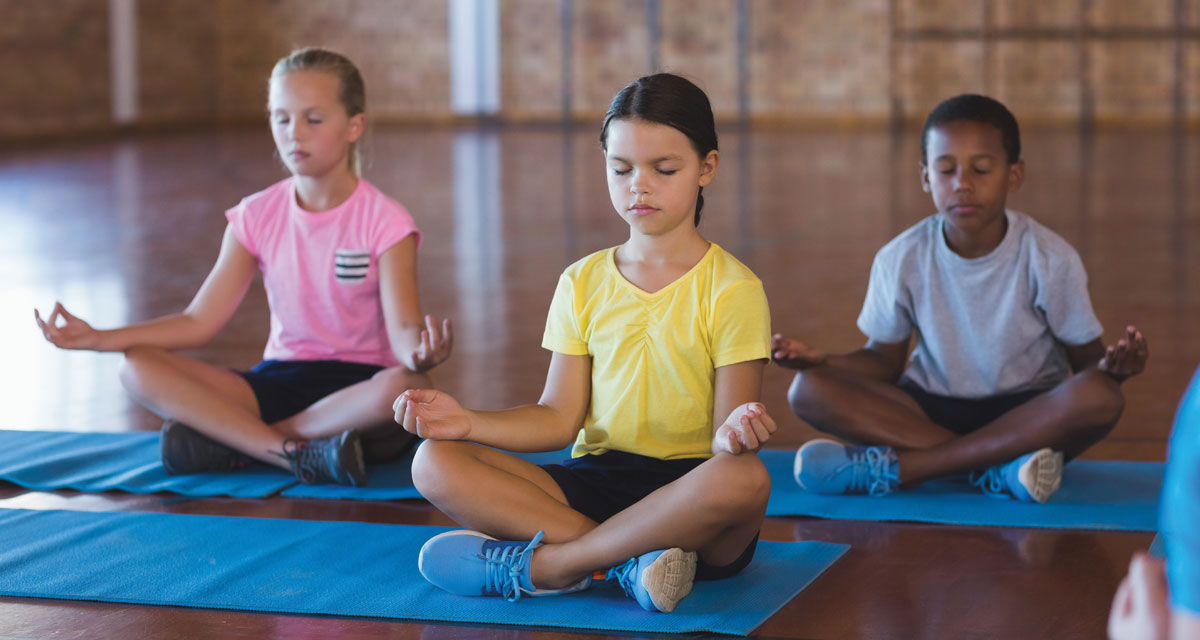Not all children run into school, excited to see their classmates and begin the day anxious to learn. A growing number arrive with high levels of anxiety, stress, and anger. As a result, schools across the nation have concluded that negative attitudes result in negative behavior. The only way to promote well-being, positive behavior, and lower the number of disciplinary problems, is to create beneficial and purposeful strategies. The impact of thinking outside the box has not only improved student performance, but frequently, it rippled to affect classroom communities and schools!
Meditation
Studies have proven most adults suffer from moderate to high stress. In feeling overwhelmed, at times, it is natural to struggle to cope. One solution to change the statistic is to implement meditation sessions, which teach breathing and repeat mantras to bolster energy and emotional well-being through silence and stillness. Schools begin the day by committing to 15 minutes of meditation exercises over the loudspeaker. Just by participating in a guided meditation exercise, teachers and students replace problems with a feeling of alertness and an attitude ready to embrace a fresh outlook. In addition to morning meditation, schools include a meditation session at the end of the day and offer a “Mindful Moments Room” to reaffirm good energy, whether the need arrives before or after lunch. Schools which adopted a mediation program noticed a drop in disciplinary problems and a focus on students, as well as teachers!
How to Start a Morning or Evening Meditation Practice
- Determine what the best time of day is to meditate;
- Define comfort, which could be in terms of clothing and, perhaps, freshening-up;
- Choose a location that would serve as a quiet space;
- Numerous meditation programs focus on breathing, repeating mantras, or combining yoga positions. Try several to find one that suits your needs;
- By eliciting one other person, such as your child, or engaging in mediation as a family, the group effort will encourage that practice occurs daily.
Obstacle Course
“‘Don’t Walk in the Hallway’ Initiative” started a progressive initiative to allow students the chance to jump, skip, hop, leap, or follow curvy lines through school hallways. In addition to promoting movement and exercise, the program creates awareness between activity and learning. Students view the patterns as a chance to focus on something other than their feelings. If angry, those emotions no longer exist by the time they reach a destination. The brightly colored adhesive strips are not permanent, and schools engage students to create new designs. It builds excitement for teamwork, promotion of activity, and connecting the school community with a program that changes the culture of schools.
The Outdoor Obstacle Course
Remember the game of hopscotch? Creating blocks with sidewalk chalk offered an easy way to promote activity and exercise. Why not expand the concept by designing a creative obstacle course with the aid of adhesive geometric lines to encourage not just children, but family members to leap, squat, bounce, and balance?
Paper Money
Who would not appreciate a reward of paper money as a method to bolster positive behavior? Most schools have their expectations, from showing kindness to a classmate in the hallway, displaying outstanding behavior on the bus, to aiding classmates with academics resulting in a reward of paper bills. However, those bills offer distinct rewards, such as shopping in the school store or allowing entrance into a special room during lunch. Donations, especially from parents, have provided chairs and couches, board games and puzzles, and sometimes television.
The Home Application of Paper Money
For most children, especially teens, negative rewards often will not promote positive actions. Parents can consider initiating a program based on a child’s or teen’s ability to make the right decisions and, perhaps, demonstrate examples of self-sufficiency. Within the home, there are creative means to define what a reward is.
Schools are not the only locations which try and conquer negative actions and poor behavior. Parents and families can benefit from the variety of programs that have proved to work! If you are seeking an alternative, why not try thinking outside the box! It may be a saving grace for the entire family!























